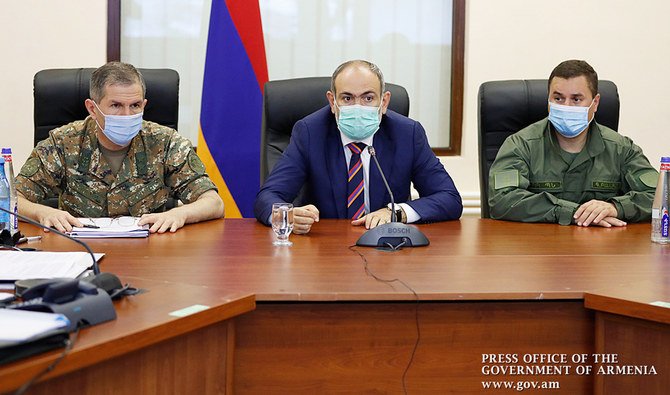
- ARAB NEWS
- 14 Jul 2025

Arab News
JEDDAH: Amid the rising escalation of conflict between Azerbaijan and Armenia, Ankara has offered its full diplomatic support to Baku.
This is along with widespread reports that it has arranged a flow of Syrian jihadists to the Azeri territories via Turkey to boost its regional partner’s military resilience during the clashes.
However, after its controversial meddling in Syria, Iraq and Libya, its active engagement in a conflict in the South Caucasus has sparked criticism about how far Ankara can go to expand its regional ambitions.
“We strongly condemn the Armenian attack that caused civilian losses and that is a clear violation of international law. Turkey fully supports Azerbaijan. We’ll stand with it anyway it wishes,” read a Turkish Foreign Ministry’s statement on Sept. 27.
Armenian officials have long claimed that some Turkish troops remained in Azerbaijan recently after they went there for joint drilling activities.
Sources from the Syrian National Army (SNA) reportedly announced that up to 1,000 jihadists were deployed to Azerbaijan as mercenaries, while sources from the Syrian Kurdish YPG militia reported that hundreds of Syrian mercenaries were moved through Turkey’s southeastern province of Kilis.
Hikmet Durgun, a Turkish journalist, claimed that these SNA militants would be deployed toward Nagorno Karabakh, a disputed landlocked region in the South Caucasus.
Sources reached by Arab News also claimed that some of the mercenaries were drawn from Turkish-backed factions on the Libyan battleground.
Syrian mercenaries are said to be recruited through the intermediary of the Turkish intelligence agency with a promised monthly wage of $2,000 each, and have been transported via Turkish military cargo planes to the Azeri cities of Ganja and Baku using the airspace of Georgia.
“About a month ago, rumors spread on WhatsApp among SNA fighters that they can register to go to Azerbaijan. Many registered over WhatsApp, others apparently through offices in the Turkish-controlled areas. The fighters registered due to the enticing rumored salaries of $2K-$2.5K,” Elizabeth Tsurkov, a fellow at the Center for Global Policy, tweeted.
Idlib post, a local news site in the Syrian Idlib province, also confirmed with a photo that a group of 300 fighters of the Syrian National Army left from the Syrian territories in the countryside of Aleppo to Azerbaijan via Turkey.
Award-winning journalist Lindsey Snell claimed that they were mainly selected from the Hamza division, a Syrian rebel group in northwestern Syria that has cooperated, as a proxy force, with the Turkish Armed Forces in military operations in northern Syria.
In the meantime, the official visit of Iranian Foreign Minister Javad Zarif to Ankara on Sunday was abruptly canceled.
Paul Antonopoulos, a regional expert, expects that Sunday’s clashes will end in a cease-fire after pressure from the EU, Russia, and perhaps even the US, to end hostilities.
“Armenia is a member state of the Collective Security Treaty Organization, a Eurasian military alliance led by Russia. This would likely deter Turkey from directly intervening militarily and thus the conflict will be contained between Armenia and Azerbaijan,” he told Arab News.
Meanwhile, Nikol Pashinyan, the prime minister of Armenia, urged the international community to “use all of its influence to halt any possible interference by Turkey, which will ultimately destabilize the situation in the region.” He also said that Turkey’s behavior could have destructive consequences for the South Caucasus and neighboring regions.
Antonopoulos thinks that there is strong evidence that Turkey has transferred militants from northern Syria to Azerbaijan, and will likely use this proxy force in the same way that they were used in Libya.
“Turkey will unequivocally support Azerbaijan in every possible way they can bar a direct military intervention. Turkey’s strong diplomatic support for Azerbaijan will continue, as well as material and intelligence aid,” he said. “I would estimate that when there is enough international pressure to end the hostilities, Russia and Turkey will mediate together to bring a temporary end to the hostilities.”
Joseh Borrell Fontelles, high representative of the EU for foreign affairs and security policy, spoke to ministers in Armenia and Azerbaijan on Sunday evening to urge an immediate cease-fire and called them to return to the negotiation table.
However, some pro-government journalists in Turkey called for the use of military force against Armenia to protect Azeri interests.
Ibrahim Karagul, the chief editor of one of the key pro-government newspapers, Yenisafak, advised the dropping of a “missile in the middle of Yerevan” to show Turkish solidarity for Azerbaijan, adding: “In this way, we can build a Caucasus Islam Army within 100 years.”